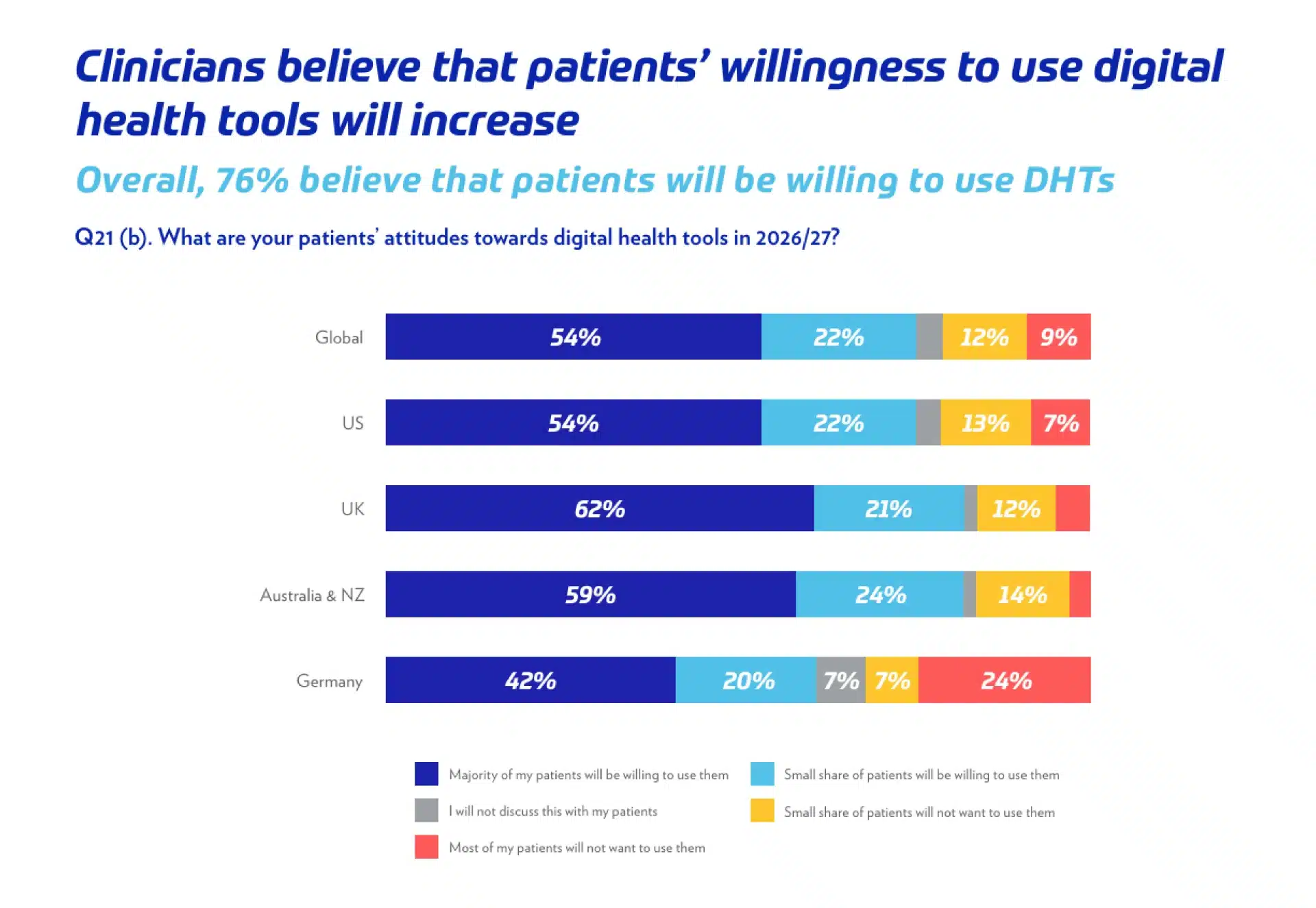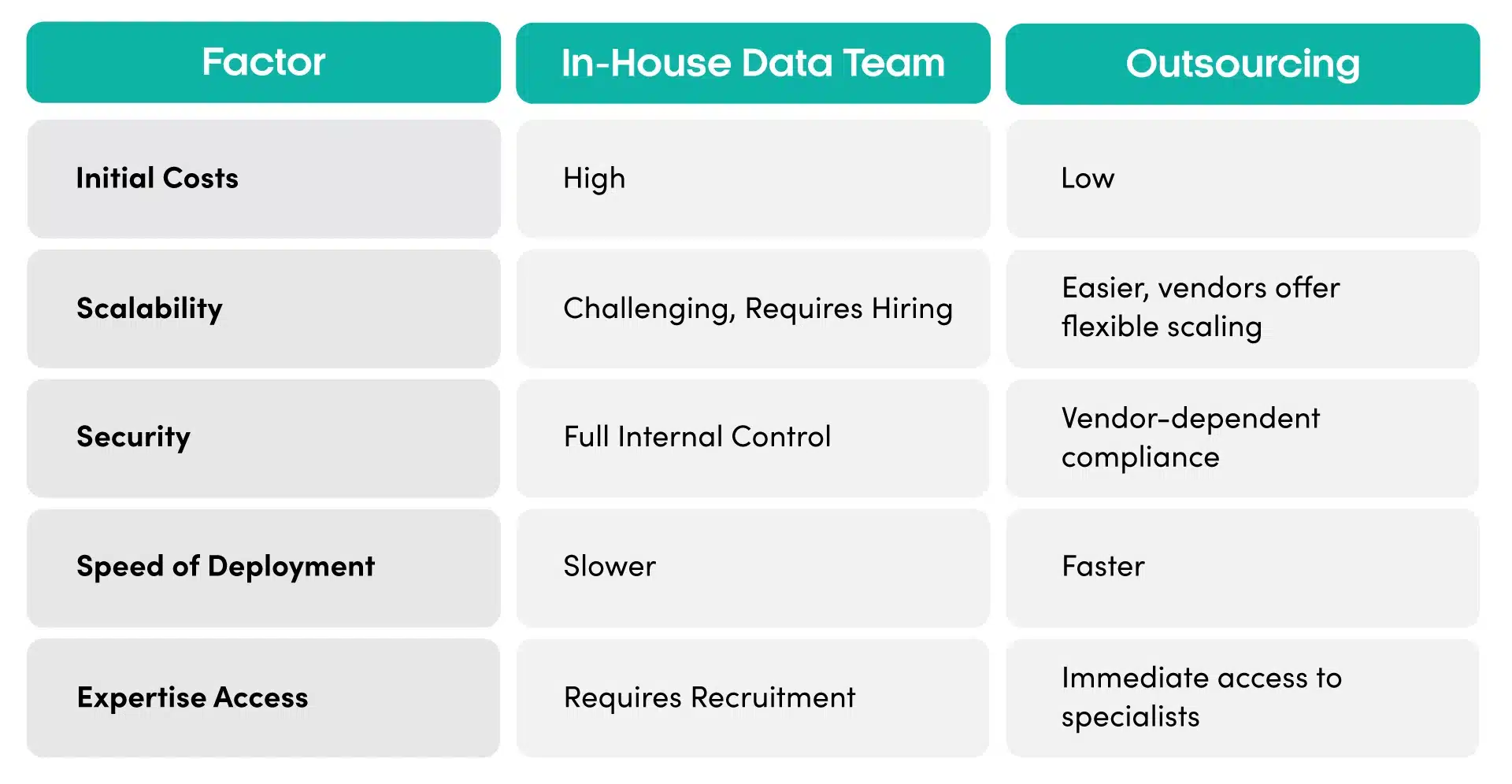In today’s world of medicine, data is everything. Electronic health records and real-time patient monitoring are key. These systems gather, store, and protect data. They have a significant impact on healthcare delivery and its future. But for healthcare companies, managing this data isn’t just about having the right tech. It’s a big-picture decision—one that can shape the future of the entire organization.
The challenge is clear: 80% of healthcare leaders view digital transformation as a top priority. 32% of people believe their companies are ready for advanced tools. This includes AI and predictive analytics. That’s according to the 2023 HIMSS Future of Healthcare Report. This shows a growing gap between what healthcare organizations want to do—and what they’re actually prepared to do.
Should healthcare companies create in-house data teams? Or would it be smarter to bring in outside experts who can fill in the gaps promptly? There’s no one-size-fits-all answer. Every choice impacts a company’s speed of innovation, rule compliance (like HIPAA), costs, and safety as it grows.
In this article, we’ll look at the pros and cons of each option. We’ll share real examples and discuss the latest trends. This will help you make a smart choice for your organization.

The Role of Data in Healthcare Startups
In today’s healthcare landscape, startups operate within a highly data driven environment. Real time analytics and predictive modeling not only support enhanced patient care but also drive operational efficiency and overall business success.
Why Healthcare Startups Need Robust Data Management
Effective data management is foundational for healthcare innovation. Startups leverage health data in several key ways:
- Patient Analytics –Big data enables the personalization of treatment plans and early identification of at-risk patients through predictive modeling.
- AI-Driven Diagnostics –Machine learning algorithms assist in enhancing diagnostic precision, reducing human error, and supporting clinical decision making.
- Operational Optimization –Advanced analytics streamline processes such as appointment scheduling, billing systems and the allocation of clinical resources.
- Regulatory Compliance –A structured approach to data ensures alignment with regulations like HIPAA in the US and GDPR in EU, minimizing legal and financial risks.
Challenges in Healthcare Data Management
Despite the opportunities, managing healthcare data presents several challenges that can hinder a startup’s growth:
- High Costs – Setting up secure, scalable infrastructure for storing and analyzing health data requires significant financial investment.
- Talent Acquisition – Attracting and retaining experienced data scientists, engineers, and compliance experts is difficult due to competitive demand.
- Security & Compliance – Given the sensitivity of health records, startups must implement rigorous security protocols and continuous compliance monitoring.
- Scalability – As data volume grows with the business, maintaining performance, accuracy, and security becomes increasingly complex.
Building an In-House Data Team in Healthcare Startups
Building an in-house data team is a strategic decision for healthcare startups aiming to maintain control over their data operations. This approach offers several advantages but also presents notable challenges.
Advantages of an In-House Data Team
Full Control Over Data Security & Compliance
Direct oversight of data management ensures adherence to regulations like the Health Insurance Portability and Accountability Act (HIPAA) in the U.S. and the General Data Protection Regulation (GDPR) in the EU. This control minimizes risks associated with third party data breaches and ensures that data handling aligns with legal requirements.
Better Alignment with Company Goals & Culture
An internal team is inherently more attuned to the startup’s vision and objectives. This alignment facilitates the development of data strategies that are tailored to the specific goals of the company. Moreover, seamless collaboration between data scientists, engineers, and healthcare professionals fosters innovation and efficiency.
Faster Iteration & Adaptability
Having an in-house team allows for immediate adjustments to algorithms, reporting structures, and workflows. This agility enables the startup to respond swiftly to evolving business needs without the delays that can occur when coordinating with external partners.
Challenges of an In-House Data Team
High Initial Costs
Establishing an internal data team involves significant expenses, including hiring full-time data scientists, engineers, and compliance officers. Additionally, investments in infrastructure such as servers, cloud storage, and analytics tools contribute to the overall cost.
Recruitment & Retention of Skilled Talent
The demand for healthcare data professionals often exceeds supply, leading to competitive salaries and challenges in attracting qualified candidates. Team member training can be time consuming. It might also divert attention away from what they do effectively.
Retention is also a concern, as larger firms may lure talent away with more lucrative offers. While you are looking for a successor, your workload increases and the entire process slows down. Resulting in delayed product launch.
Scalability Issues
As the startup grows, expanding an in-house team requires substantial investment in hiring and training. Furthermore, the increasing volume of data may outpace the capabilities of a small internal team, potentially hindering performance and scalability.
And overtime is both expensive and exhausting. It would help if you only relied on Overtime to get things done on rare occasions. It’s a short-term solution.
Ultimately, while building an in-house data team offers control and alignment with company culture, healthcare startups must carefully weigh these benefits against the significant costs and challenges associated with recruitment, retention, and scalability.
Outsourcing Data Analysis for Healthcare Startups
Imagine a promising healthcare startup has just launched a revolutionary app to monitor chronic conditions in real time. The user base grows rapidly, and the pressure to deliver accurate insights, sensitive information and stay compliant with regulations mount by the day.
The small in-house team, once energized, is suddenly overwhelmed—data pipelines are lagging, compliance checks are falling behind, and hiring skilled data engineers feels like searching for a needle in a haystack.
Faced with these challenges, the founders make a critical decision to outsource their data operations to a specialized provider.
Benefits of Outsourcing Data Teams
Access to Specialized Expertise
Experienced Data Scientists: Startups gain access to experienced data professionals without recruiting challenges. FasterCapital, for instance, provides comprehensive healthcare data analytics services ensuring secure data collection.
Diverse Vendor Options: Platforms like Clutch.co list numerous IT service providers specializing in healthcare solutions, enabling startups to find partners aligning with their specific needs.
Cost Efficiency
Reduced Administrative expenses: Outsourcing lowers costs for training, and full-time salaries. By using outside resources, startups might avoid making substantial infrastructure investments.
Scalable Payment Models: A lot of vendors provide adjustable, pay-as-you-go pricing plans that let new businesses adjust costs to suit their current demands and grow as required.
Faster Deployment of Solutions
Established Workflows: The time from development to deployment is shortened by the improved procedures that external providers have developed to speed up the workflow.
Modern Technologies: Startups can quickly access cloud-based data processing capabilities and AI-driven analytics by collaborating with specialized vendors, which improves their operational efficiency.
Risks of Outsourcing
Healthcare Data Security Concerns
- Privacy issues arise when patient data is shared with third-party organizations.
- Commitment to laws such as HIPAA needs to be monitored closely.
Limited Internal Control & Vendor Dependency
- Long-term dependence can become expensive if pricing structures change.
- Startups may become dependent on a single source, causing lock-in issues.
Communication & Integration Challenges
- External teams may not fully understand the startup’s specific needs.
- Integrating outsourced solutions with existing systems can be complex.
Comparing In-House vs. Outsourcing: Which is Better for Healthcare Startups?

Scalability Comparison
- In-House: More scalable for startups with predictable, long-term data needs.
- Outsourcing: Best for early-stage startups needing flexibility in scaling.
Case Study Insights
Flatiron Health (In-House Model) – Built an internal data team for oncology-focused AI solutions, ensuring full control over regulatory compliance. This in-house approach allows Flatiron to have direct oversight of data security aligning with regulations such as HIPAA in the U.S. and GDPR in Europe.
Babylon Health (Outsourcing Model) – Outsourced data analysis for AI-powered telemedicine services while focusing on core business growth. In addition to AI-driven tools Babylon health connects patients with healthcare professionals through vital consultations including video calls and messaging.
Industry Trends & Expert Insights
AI-driven solutions, hybrid data methods, and improved regulatory compliance measures are all driving major changes in the healthcare sector. These developments are changing how both new and established businesses manage data and comply with legal requirements.
- Hybrid Data Strategies—many startups use a hybrid model, blending in-house and outsourced data teams for cost effective scalability.
- AI-Driven Data Solutions—Advances in AI-automation reduce the need for large in-house teams, making outsourcing more viable.
- Regulatory Compliance Enhancement—Vendors are obtaining HIPAA & GDPR certifications to ease security concerns.
Final Verdict & Best Practices for Healthcare Startups
When to Build an In-House Data Team
Ongoing Data Analysis and AI development needs: Building an in-house team may represent the best course of action if the development of AI-driven products or ongoing, real-time data analysis is crucial to the success of your company.
Security and Compliance control: For startups operating in highly regulated sectors like healthcare where data security is paramount, having full internal control over data analysis and infrastructure is crucial. An in-house team enables direct oversight of compliance with regulations like HIPAA or GDPR.
Long-term Investment in Data Infrastructure: An in-house data team can represent a considerable advantage if your firm has sufficient resources to invest consistently in creating reliable data platforms.
When to Outsource Data Analysis
Limited Resources for Hiring and Training: Resource limitations are a common problem for startups, particularly in initial stages. Outsourcing can give you instant access to qualified experts without requiring a significant initial investment, which is advantageous if hiring and training a full-time data team.
Rapid Project Deployment with No Long-Term Commitment: Outsourcing gives your firm the flexibility it needs whether it has to construct a particular AI model without committing to a long-term project or launch a data-driven product rapidly.
Focus on Cost Efficiency: Managing expenses is crucial to the expansion of many startups. When the range of work is too large to justify the cost of an internal team, outsourcing data analysis gives you access to top-tier insight at a fraction of the cost of hiring full-time workers.
Hybrid Approach: The Best of Both Worlds
- Retain a small in-house team for core functions while outsourcing specialized tasks.
- Outsource non-sensitive data tasks to reduce workload without security risks.
The decision to build an in-house team or outsource data operations largely depends on your startup’s specific needs, financial capacity, and the scale at which you aim to operate. Each approach has its advantages, but both can be tailored to maximize efficiency, data security, and long-term success.
Conclusion
When it comes to data management in a healthcare startup, there isn’t a single solution that works for everyone. Ask yourself these important questions before considering whether to outsource experts or create an in-house team.
- What’s our budget for data management?
- How fast are we planning to grow?
- Do we need full control over our data and systems?
- Can we stay compliant with healthcare regulations on our own?
- Do we have access to the right talent, or will outsourcing fill the gaps faster?
Use these questions to guide your strategy. The goal isn’t just to manage data, it’s to grow safely, scale smartly and stay ahead in a fast-changing industry.
What will your data strategy look like a year from now? Let us know in the comments!

